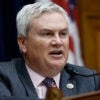As Republicans push for the Syrian refugee program to be halted, former defense and national security officials today sought to reassure lawmakers that while risks cannot be fully eliminated, they can be mitigated to ensure terrorists do not enter the United States.
During a joint hearing of the House Foreign Affairs and Homeland Security committees examining terrorist threats in the U.S., the former officials testified that although they believe the refugee program already mandates a stringent level of security, Republicans are right to further investigate the Syrian refugee issue.
“The vetting process that is in place for any individual coming here through the refugee program needs to be as stringent as possible. All possible assurances need to be in place that that person doesn’t pose a threat,” Matthew Olsen, former director of the National Counterterrorism Center, said. He continued:
I think the longer answer is that any process is going to include some risk, so it’s impossible to eliminate all risk for every single person coming into this country. That’s just a fact of any process like this. But the process that’s in place for these refugees is quite extensive and … involves multiple layers.
Refugees seeking to resettle in the United States under the Refugee Admissions Program endure what retired Army Gen. Jack Keane and his fellow intelligence experts said was an “extensive” vetting process. A number of government agencies and the intelligence community conduct background checks, collect biographical and biometric data—which are checked against federal and international databases—and hold in-person interviews with each refugee.
“The president’s own intelligence and law enforcement officials have warned this committee of the risks involved with the Syrian refugee program in this high-threat environment, and I have got to take them at their word,” Homeland Security Committee Chairman Mike McCaul, R-Texas, said during opening remarks Wednesday.
“I have called upon the president to temporarily suspend Syrian refugee admissions in the United States until we can improve the screening and vetting process, but we will not wait for the president to take action.”
Following congressional testimony from Federal Bureau of Investigation Director James Comey last month, during which he said Syrian refugees would be difficult to thoroughly screen, Republicans have been critical of the U.S. Admissions Program and fear Islamic State terrorists could seize upon the system’s vulnerabilities and end up in the United States.
Republicans’ concerns were further heightened following reports that a fake Syrian passport was found on one of the terrorists who orchestrated the attacks in Paris.
“We’re not shutting the door on anyone. … This is not in any anti-Muslim or any anti-refugee issue,” Rep. Peter King, R-N.Y., said. “It’s a question of the extent of the vetting and the fact that it appear that there’s a rush to judgment by the administration to step up and advance the vetting process.”
Still, the national security experts appearing before lawmakers stressed that while there is no way to “eliminate” all risks, they can be mitigated.
“When it comes to the refugee program, the ones we’ve used in the past and certainly with what we’re applying with regard to Syrian refugees, there’s really no program in the world that’s as extensive as what the United States does,” Olsen said. “We can do this in terms of managing this problem. No process can eliminate 100 percent of the risk associated.”
Under the country’s Refugee Admissions Program, the United States is expected to resettle 85,000 refugees in 2016, with at least 10,000 of those refugees coming from Syria. There are currently 4 million Syrians fleeing the Middle Eastern country, and the United States has accepted just under 2,000 since 2011.
Following Friday’s terror attacks in Paris that left 129 dead and more than 350 injured, political leaders at both the state and federal level have called on the Obama administration to temporarily stop allowing Syrian refugees into the United States.
Keane, a retired Army general, said, “I’m absolutely convinced that you’re doing the right thing by pausing and making certain that the Congress takes a look at the executive branch’s plans and makes certain that it’s reasonable what we’re doing in terms of the vetting process,” but noted that the U.S. has had over 1 million refugees come since 9/11. “We can manage this thing.”
He also advocated for the Syrian refugees, saying:
I don’t know how the United States of America can possibly say no to people who are pouring out of that country given the horror that’s taken place and given the contribution to that horror, frankly, when we had significant opportunities to create some huge momentum against the Assad regime. For four plus years he’s been marauding over that population, killing 250,000, creating 11 million displaced. Some of those obviously have the opportunity to come here.
Some Republicans are calling for the country to accept only Christian refugees, while others like McCaul want to see the Syrian refugee program, specifically, halted until intelligence agencies can fully verify that Syrians looking to resettle pose no threat to the United States.
“If we’re going to be serious here, let’s, number one, if Christians are the people who are the most targeted in that region—and everybody I know says that, they’re targeted for genocide—they should have the priority when we’re trying to give safe haven to people,” Rep. Dana Rohrabacher, R-Calif., said Wednesday. “I don’t care if that touches on somebody’s sensitivity overseas. Number two, we have to be concerned about the safety of the people here in the United States. If we’re going to bring in people here, at least these Christians wouldn’t be potential terrorists.”
However, in responding to calls for the United States to allow only Christian refugees into the country, Keane said such statements fuel ISIS’ motivations.
“Some of the voices that are out there about this are playing right into ISIS’ hands,” the four-star general said. “When we walk about, ‘Let’s only take Christians.’ That’s a horrific statement. This is what ISIS wants. ISIS wants fragmentation between Muslims and nonmuslims. That’s an irresponsible statement to make.”































